NetHunt CRM Alternatives
Searching for NetHunt CRM alternatives? We compare 10 options, breaking down features and pricing to help you find the right fit.

You might be using NetHunt CRM for good reasons. It works well inside Gmail and helps organize customer data right in your inbox. For many teams, especially those in Google Workspace, it's a solid choice for managing sales pipelines and customer relationships.
Still, some users find it has a learning curve or lacks features for complex needs. We've identified the best alternatives and analyzed their pros and cons against NetHunt CRM based on G2 reviews. This will help you shortlist top options for a deeper look. Let's get started.
Add Digital Workers To Your Sales Efforts
If your goal is to use digital workers for sales tasks, look at 11x. They can take over repetitive work like CRM updates or lead qualification. This lets your sales team spend more time on sales.
At 11x, we provide a GTM platform where AI agents manage your sales process.
Our AI agent, Alice, finds high-intent prospects, performs outreach on email and LinkedIn, and keeps your CRM updated.
Another agent, Julian, qualifies inbound leads and books meetings for your team.
We replace separate tools for data enrichment, outreach, and email warmup by unifying these functions in one platform.
NetHunt CRM Alternatives
Here are the top alternatives to NetHunt CRM. We will compare each tool's pricing, main features, and its pros and cons against NetHunt to help you make an informed decision.
1) HubSpot CRM
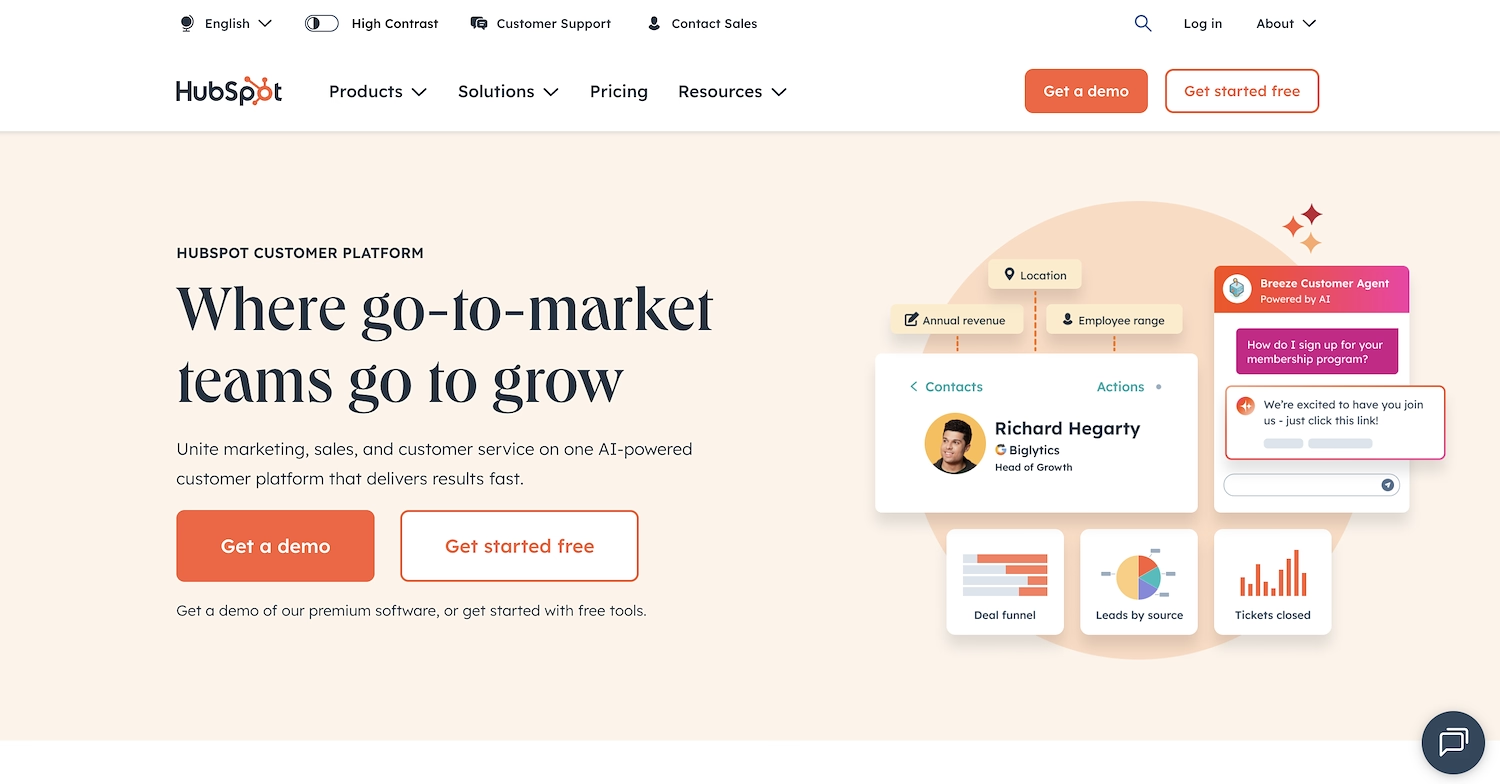
HubSpot CRM is a platform that connects company data and customer information in one place. It offers tools for marketing, sales, and service teams. The system tracks customer interactions and gives a clear view of the sales pipeline. This helps businesses manage their customer relationships from start to finish.
HubSpot CRM's Main Features
- The system centralizes company data with customer information, creating a unified contact record.
- It includes integrated toolsets for marketing, sales, and customer service departments.
- The platform automatically logs customer interactions across various touchpoints.
- It provides a visual dashboard that displays the entire sales pipeline.
How HubSpot CRM Compares to NetHunt CRM
Average Review score: 4.4/5 stars based on 12,407 G2 reviews.
- HubSpot CRM provides a complete marketing automation suite. This allows for complex lead nurturing campaigns, which extends beyond NetHunt's core email integration.
- The platform includes dedicated customer support tools like case management. This provides a service solution that is not a primary focus of NetHunt CRM.
- It scales with your business through its different hubs for sales, marketing, and service. This all-in-one approach offers more room for growth than NetHunt's Gmail-centric system.
- HubSpot's app marketplace offers extensive integrations with many business applications. This provides a wider range of connectivity options compared to NetHunt's primary focus on the Google Workspace ecosystem.
Where NetHunt CRM Has An Edge Over HubSpot
- HubSpot CRM operates as a separate platform, unlike NetHunt's native Gmail integration. This may require users to switch contexts between their inbox and the CRM, a less efficient process for teams that work entirely within Gmail.
- The platform's extensive features can create a steeper learning curve compared to NetHunt. For small teams that need a simple solution, the need to navigate HubSpot's broad functionality might feel overwhelming at first.
- Its pricing structure can become costly as a team grows. While a free version exists, advanced features require plans that might be a larger investment compared to NetHunt's more focused offering.
Pricing and Cost-Effectiveness
HubSpot offers a free CRM, and its paid Sales Hub plans are priced at $20 for Starter, $100 for Professional, and $150 for Enterprise per seat monthly. A direct cost comparison requires consulting NetHunt's official pricing, as that data was not provided.
2) Zoho CRM
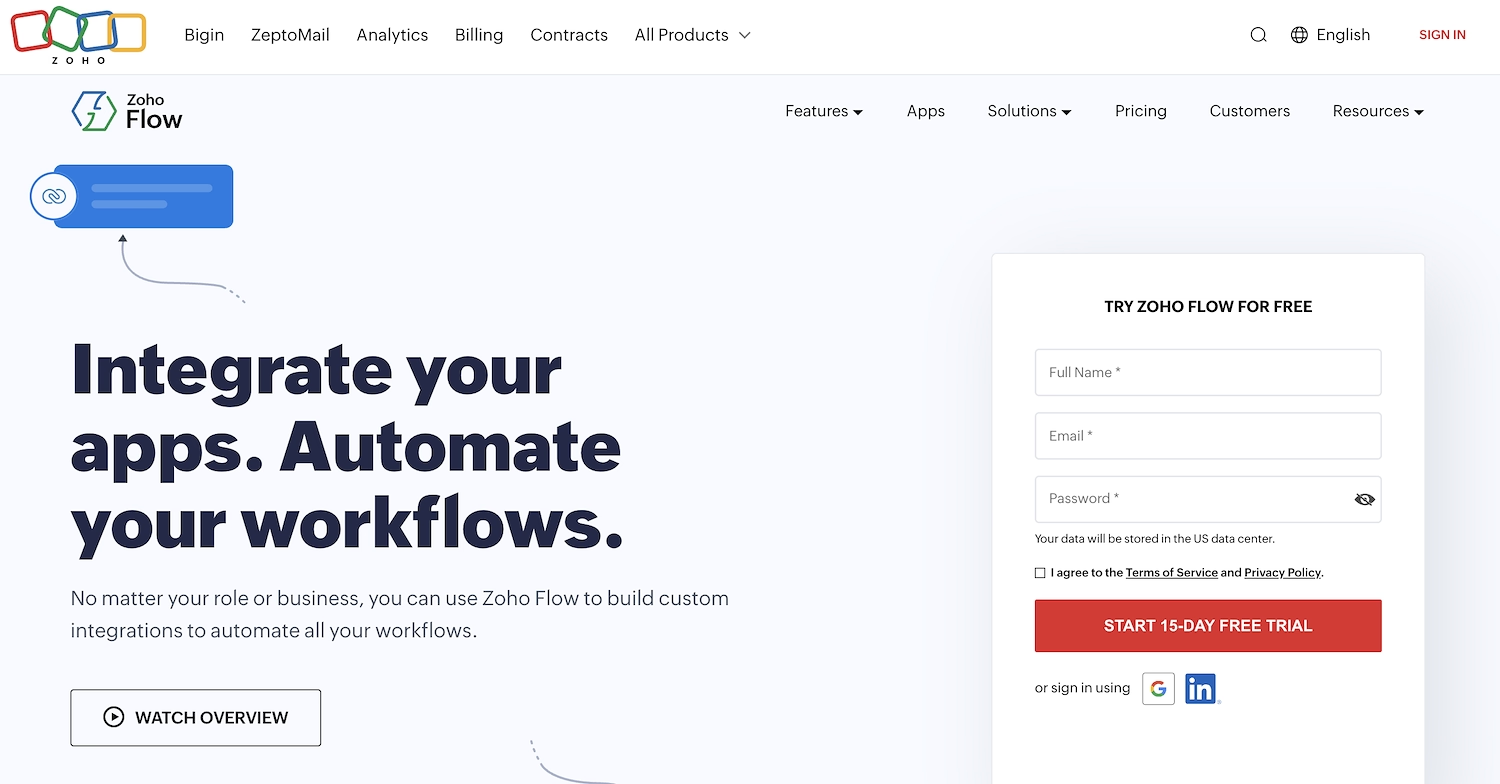
Zoho CRM is a cloud-based platform for customer relationship management. It helps organizations convert leads and build relationships. The system promotes cross-functional collaboration with separate workspaces for different departments like marketing and finance.
It uses AI for tasks such as email composition and anomaly detection. The platform provides a 360-degree view of each customer and automates processes through workflows to accelerate deal cycles.
Zoho CRM's Main Features
- The platform provides Teamspaces, which are dedicated work areas that allow each department to see only the data it needs.
- It incorporates Zia and Agentic AI for tasks like email rewriting, anomaly detection, and generating predictive insights.
- The Canvas Design Studio offers drag-and-drop UI customization and can generate layouts from images.
- It includes sales automation with advanced workflows, cadences, and a configure-price-quote (CPQ) function.
How Zoho CRM Compares to NetHunt CRM
Average Review score: 4.1/5 stars based on 2,820 G2 reviews.
- Zoho CRM includes an AI assistant, Zia, for predictive insights. This provides a data analysis layer that is different from NetHunt's core CRM functions inside Gmail.
- It connects with over 500 business applications. This offers more integration options compared to NetHunt's primary focus on the Google Workspace ecosystem.
- The platform provides features for inventory management and customer support. This expands its use beyond sales, unlike NetHunt, which centers on sales pipeline management within your inbox.
- Zoho CRM offers advanced sales tools like a configure-price-quote (CPQ) function. This automates complex quoting, a feature not central to NetHunt's Gmail-based workflow.
Where NetHunt CRM Has An Edge Over Zoho CRM
- Zoho CRM operates as a standalone platform. This requires users to switch contexts between their email and the CRM, unlike NetHunt, which works directly inside the Gmail interface. Some teams may find this less efficient.
- Its interface can feel cluttered to some users. This may create a steeper learning curve compared to NetHunt's simpler layout, which is designed to work within the familiar Gmail environment.
- The platform's broad functionality covers many business areas, which might be more than a small sales team needs. NetHunt offers a more focused solution for sales pipeline management inside your inbox.
Pricing and Cost-Effectiveness
Zoho CRM offers a free plan, with paid tiers at $14 (Standard), $23 (Professional), and $40 (Enterprise) per user monthly. A direct cost comparison is not possible as NetHunt's pricing was not provided. You can check the detailed pricing on Zoho CRM's official website.
3) Pipedrive
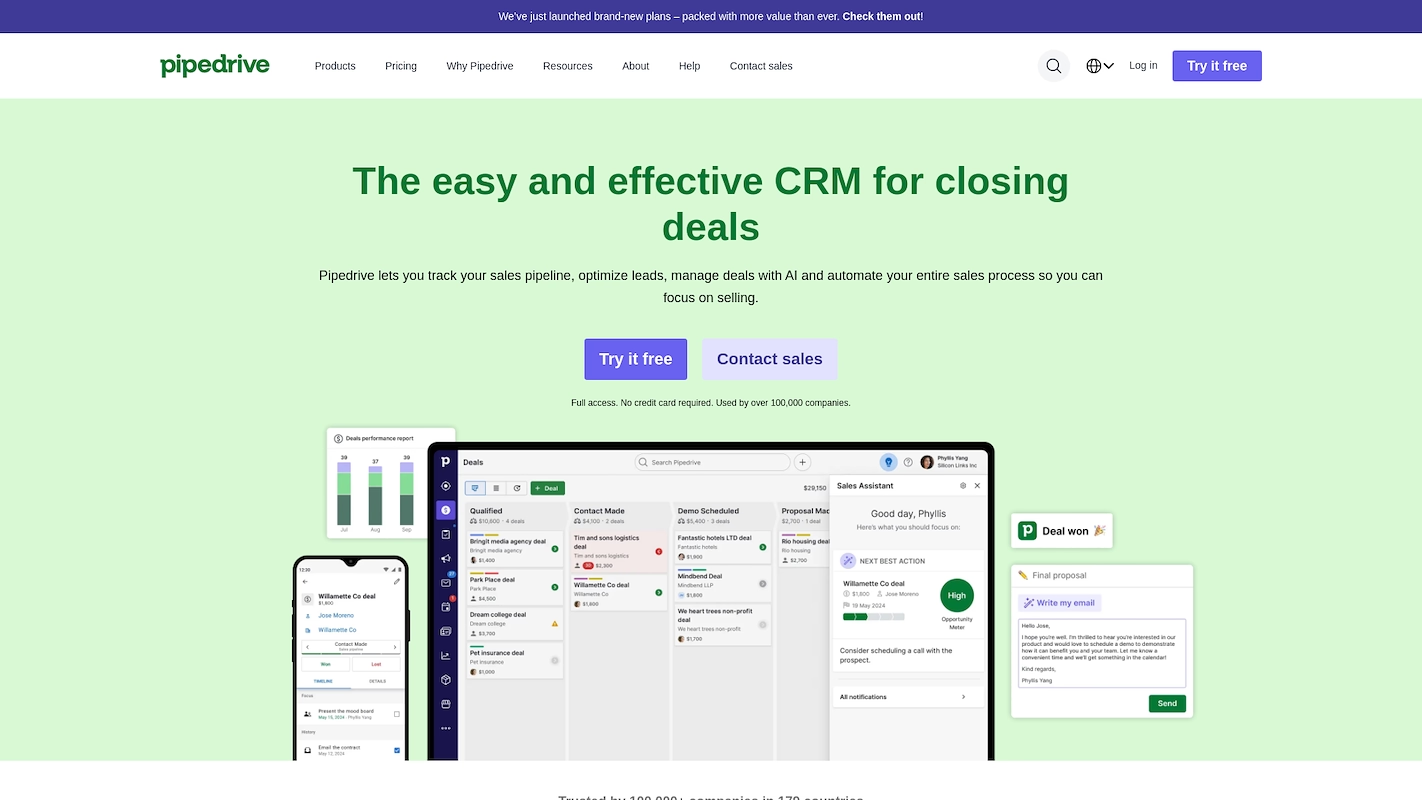
Pipedrive is a web-based CRM for sales teams. It helps track pipelines, manage deals, and automate work through visual, kanban-style boards. The platform centralizes customer data and communications in one workspace.
It uses AI for guidance to prioritize deals and provides real-time sales forecasts. The system also syncs with email and calendars to speed up response times.
Pipedrive's Main Features
- Manages deals through visual, kanban-style pipelines with custom stages and fields.
- Provides deal-win predictions and daily insights with an AI Sales Assistant.
- Automates lead nurturing using multi-step email sequences and two-way email sync.
- Generates real-time sales forecasts for recurring and one-off deals.
How Pipedrive Compares to NetHunt CRM
Average Review score: 4.3/5 stars based on 2,573 G2 reviews.
- Pipedrive provides a visual sales pipeline where users can drag and drop deals between stages. This offers a different user experience than managing pipelines within the NetHunt Gmail interface.
- Its AI Sales Assistant gives deal-win predictions and personalized tips. This adds a layer of predictive analytics that is not a core feature of NetHunt's CRM.
- The platform automates lead nurturing with multi-step email sequences. This allows for more structured outreach campaigns compared to NetHunt's primary function of managing email communications inside Gmail.
- It generates real-time sales forecasts for recurring and one-off deals. This provides a specific financial planning tool that is different from the pipeline and contact organization features central to NetHunt.
Where NetHunt CRM Has An Edge Over Pipedrive
- Pipedrive operates as a separate platform, which requires users to switch between their email and the CRM. In contrast, NetHunt works directly inside Gmail, which can be more efficient for teams that conduct sales primarily from their inbox.
- The tool is built around a sales pipeline, which might be less suitable for post-sale activities. NetHunt keeps all communications within the Gmail interface, which allows for a more continuous management of the customer relationship after a deal closes.
- Some users find the distinction between Companies and People contacts in Pipedrive can be cumbersome. NetHunt turns Gmail contacts into CRM records, an approach that may feel more direct for data organization that starts from an email.
Pricing and Cost-Effectiveness
Pipedrive offers plans starting at $24 per seat monthly for Lite, up to $99 for Ultimate. A direct cost comparison is not possible as NetHunt's pricing was not provided. For the most accurate information, check Pipedrive's official website.
4) Salesforce Sales Cloud
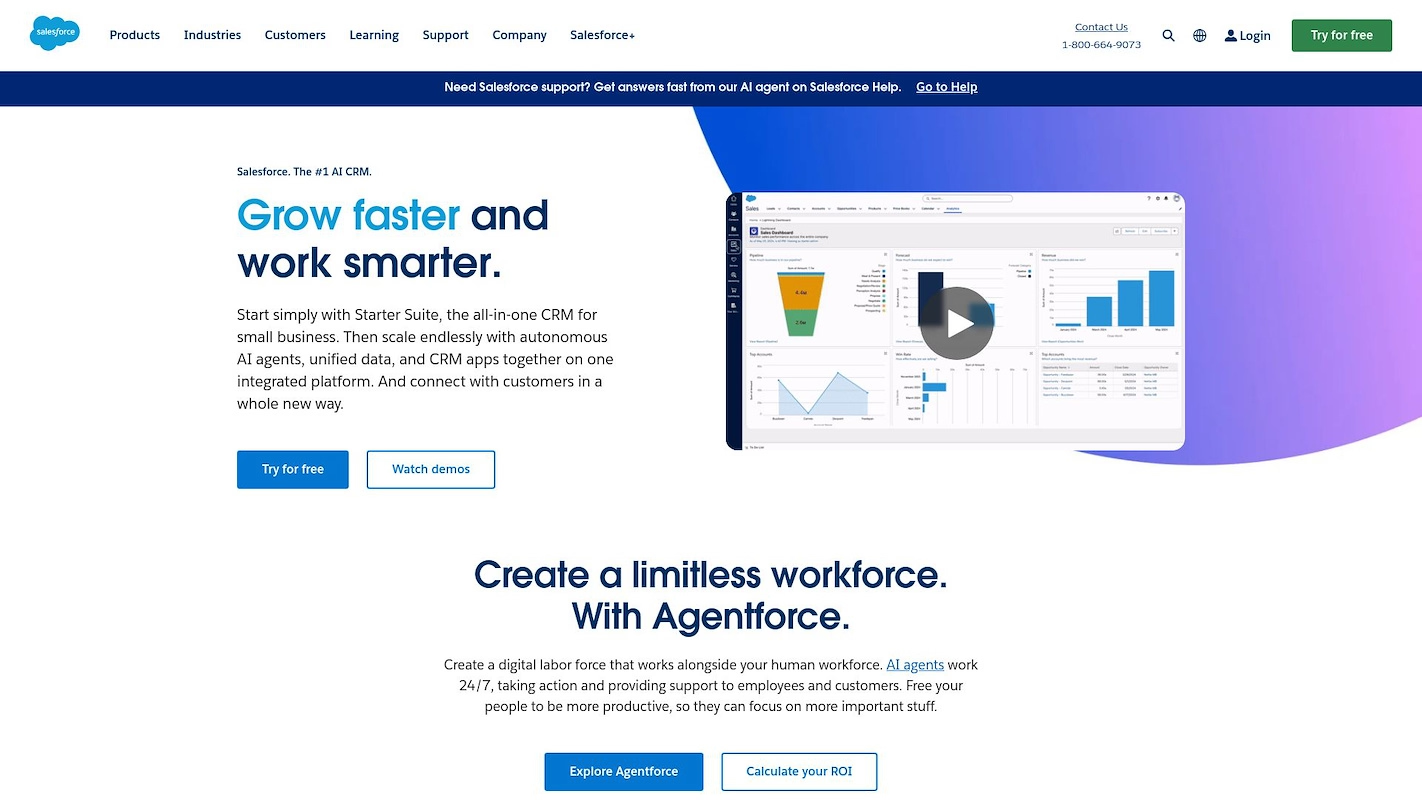
Salesforce Sales Cloud is a CRM platform for sales teams. It supports the sales process from lead acquisition to payment. The system provides tools to find buyers, manage deals, and increase rep productivity. It offers data insights to help a business scale.
Use cases include sales forecasts, performance management, and lead management. The platform also handles partner relationships and sales data.
Salesforce Sales Cloud's Main Features
- Provides real-time, customizable forecasts and tracks performance trends.
- Automates territory assignments and complex processes with a drag-and-drop flow builder.
- Generates templated quotes that sync to opportunities and automates approval flows.
- Guides sellers through deals with opportunity playbooks and AI-powered insights.
How Salesforce Compares to NetHunt CRM
Average Review score: 4.4/5 stars based on 23,364 G2 reviews.
- Salesforce Sales Cloud provides a drag-and-drop flow builder for complex process automation. This offers more advanced workflow capabilities compared to NetHunt's automation within Gmail.
- The platform includes a configure-price-quote (CPQ) function to generate and manage complex sales quotes, a specialized tool not central to NetHunt's Gmail-based system.
- It offers dedicated tools for Partner Relationship Management (PRM), expanding its use to channel sales, which is outside the scope of NetHunt's direct customer focus.
- The system uses AI for revenue intelligence and sales forecasting, providing a deeper analytical layer than the standard pipeline tracking available in NetHunt.
Where NetHunt CRM Has An Edge Over Salesforce
- Salesforce Sales Cloud is a separate platform, so users must switch between their email and the CRM. In contrast, NetHunt CRM works directly inside Gmail, which some teams find more efficient for daily tasks.
- The tool's extensive features can create a steep learning curve for new users. Some teams might find the initial setup takes more time compared to NetHunt's more direct integration within the familiar Gmail interface.
- Its pricing can be a large investment, especially as a team grows. For businesses that need a simple sales pipeline tool, NetHunt's focused approach may present a more cost-effective option without the enterprise-level complexity.
Pricing and Cost-Effectiveness
Salesforce Sales Cloud plans start at $25 per user per month, with higher tiers at $100, $165, and $330. A direct cost comparison with NetHunt CRM is not possible as its pricing data was not provided. Check the detailed pricing of Salesforce Sales Cloud on Salesforce Sales Cloud's official website.
5) Copper CRM

Copper CRM is a tool built for Google Workspace. It organizes contacts, emails, and files in one place to help manage leads and projects. The system works inside Gmail and other Google applications, which lets teams track relationships without a context switch.
Use cases include sales pipeline management and client project oversight. The platform centralizes customer data from Google apps.
Copper CRM's Main Features
- Works directly inside Gmail and Google Calendar to manage tasks and add leads without leaving the inbox.
- Tracks deals using customizable, drag-and-drop sales pipelines with deal values and stage automation.
- Manages projects by duplicating closed deals to assign tasks and track delivery across teams.
- Automates workflows with recurring tasks and triggers reminders when pipeline stages change.
How Copper CRM Compares to NetHunt CRM
Average Review score: 4.5/5 stars based on 1,139 G2 reviews.
- Copper allows users to manage client projects by converting closed deals into project pipelines. This offers a more structured way to handle post-sale activities compared to NetHunt's focus on sales pipeline management within Gmail.
- It is an officially Recommended for Google Workspace application. This provides a level of integration and vetting that is different from other tools that simply work with Google products.
- The tool connects directly to Looker Studio and exports data to Google Sheets with a custom report builder. This gives teams more advanced options to visualize data than the standard reporting inside NetHunt.
- Copper includes features for customer support, such as case management and a knowledge base. This expands its use beyond sales, an area where NetHunt is more narrowly focused.
Where NetHunt CRM Has An Edge Over Copper
- Copper includes project management tools, which can add complexity for teams focused purely on sales. NetHunt provides a more direct solution for sales pipeline work within the inbox.
- Its interface often works as a side panel in Gmail. Some users may prefer NetHunt's approach, where CRM functions are embedded directly into the email layout for a more native feel.
- The platform's pricing can be higher due to its expanded feature set. Teams that need only core sales tools may find NetHunt's more focused approach aligns better with their budget.
Pricing and Cost-Effectiveness
Copper's paid plans start at $23 per user monthly for the Basic plan, with Professional and Business tiers at $59 and $99. A direct cost comparison with NetHunt CRM is not possible as its pricing data was not provided. You can check the detailed pricing on Copper CRM's official website.
Consider Digital Workers For Your Sales Team
If your goal is to automate sales work, digital workers are an option. At 11x, our platform uses AI agents to manage parts of your sales process. They find prospects and keep your CRM updated.
This approach can replace separate tools for data and outreach. If you want to add this type of automation to your sales team, you can learn more about how our AI agents operate.
At 11x, we use AI to run your sales playbook. Alice finds accounts, enriches their data, and performs outreach. Julian qualifies inbound leads and books meetings. We replace separate tools for data, outreach, and email warmup, unifying them into one platform.
Book a demo to see how it works.
6) Insightly CRM
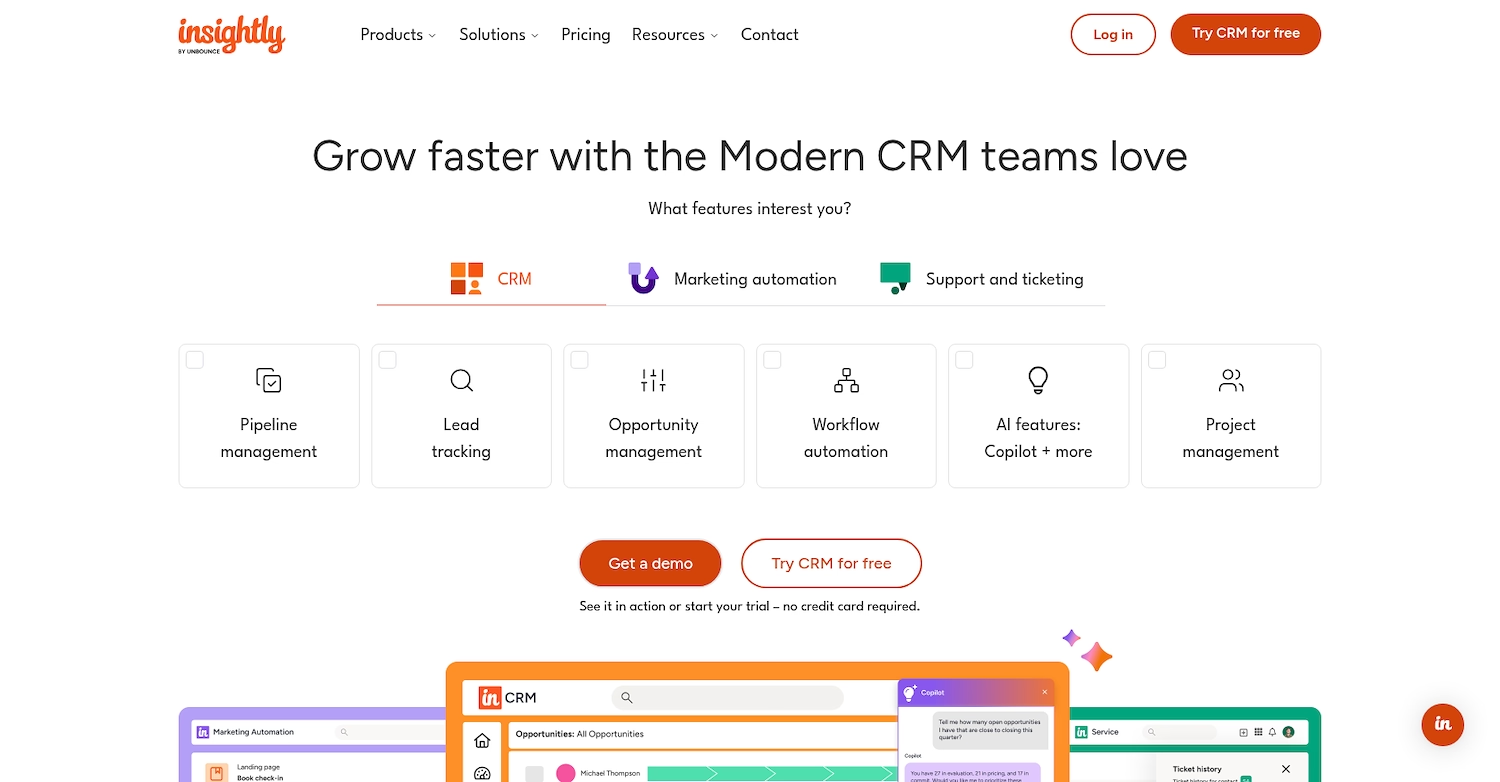
Insightly CRM is a platform that unifies marketing, sales, and project management tools. It helps businesses build a complete view of the customer. The system allows teams to manage data, track leads, and oversee projects from one application.
Use cases include sales automation and project delivery. This helps align different departments on all customer-related activities.
Insightly CRM's Main Features
- Includes marketing automation with visual journeys, A/B testing, and dynamic list segmentation.
- Provides a customer support module with a ticketing system, knowledge base, and SLA tracking.
- Offers a no-code integration layer, AppConnect, for workflow automation with tools like Slack, Jira, and QuickBooks.
- Contains a landing-page builder and tools for managing products, price books, and quoting.
How Insightly CRM Compares to NetHunt CRM
Average Review score: 4.2/5 stars based on 922 G2 reviews.
- Insightly CRM includes project management tools to handle post-sale activities. This differs from NetHunt, which focuses more on managing the sales pipeline inside Gmail.
- It provides a quoting function (PPQ) to create and manage sales quotes. This offers a more specialized sales tool compared to NetHunt's core function of organizing contacts and emails.
- The platform has a dedicated customer support module with a ticketing system. This expands its use beyond sales, an area where NetHunt is more narrowly focused.
- Its AppConnect feature allows for integrations with over 500 applications. This provides a wider range of connectivity options than NetHunt's primary focus on the Google Workspace ecosystem.
Where NetHunt CRM Has An Edge Over Insightly
- Insightly CRM operates as a standalone platform, so users must switch between their email and the CRM. Some teams may find this less efficient compared to NetHunt, which works directly inside the Gmail interface.
- The tool includes project management and service features. This might add complexity for a team that only needs a sales pipeline tool, where NetHunt offers a more direct solution inside the inbox.
- Its extensive functionality can feel overwhelming for new users. In contrast, NetHunt’s design, which embeds CRM functions into the familiar Gmail layout, may be quicker for some teams to adopt.
Pricing and Cost-Effectiveness
Insightly CRM offers paid plans at $29 for Plus, $49 for Professional, and $99 for Enterprise per user monthly when billed annually. A direct cost comparison with NetHunt CRM is not possible as its pricing data was not provided. You can check the detailed pricing on Insightly CRM's official website.
7) Streak CRM
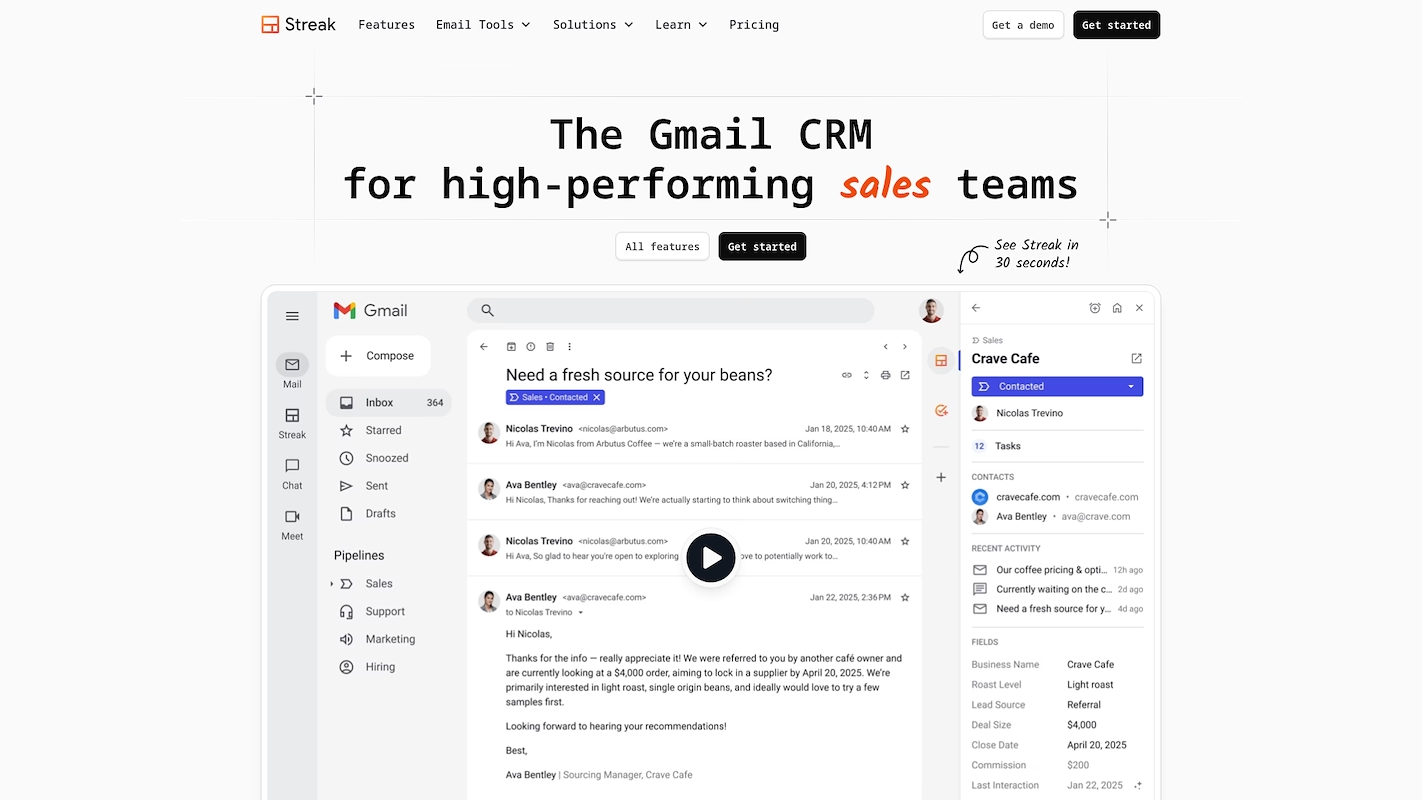
Streak CRM is a tool that works directly inside Gmail. It helps teams manage workflows like sales, recruitment, and support from their inbox. The platform organizes all emails, files, and notes for a contact or deal into a central view, which removes the need to switch between applications.
Streak CRM's Main Features
- The platform uses customizable, spreadsheet-like views called pipelines and “boxes” to track deals and projects.
- An AI assistant auto-fills data, answers questions in natural language, and adds “magic columns” like Days in Stage.
- It provides email tools such as a thread splitter for long conversations, mail merge, and email tracking.
- The system automatically logs every email from all team members into the deal timeline.
How Streak CRM Compares to NetHunt CRM
Average Review score: 4.5/5 stars based on 249 G2 reviews.
- Streak manages multiple workflows, including hiring and projects, directly within Gmail. This offers more versatility than NetHunt, which centers on sales pipeline management.
- It includes an AI assistant that automatically fills data and adds special columns to your pipelines. This provides a layer of automation different from the core functions in NetHunt.
- The tool offers advanced email features like a thread splitter for complex conversations. This gives users more control over their inbox compared to the standard email integration in NetHunt.
- Streak CRM uses a spreadsheet-style view to organize pipelines and projects. This visual approach to data management is a different experience from how NetHunt embeds CRM fields into the Gmail layout.
Where NetHunt CRM Has An Edge Over Streak
- Some users report that contact management in Streak feels less direct. In comparison, NetHunt turns Gmail contacts into CRM records, a method that can simplify data entry and organization for information that comes from an email.
- The tool uses a spreadsheet-style interface to manage pipelines. Teams that prefer a more native feel might find this different from NetHunt, which embeds its CRM fields directly into the standard Gmail layout.
- Its design supports multiple workflows, including hiring and projects. This may add complexity for a team that needs a dedicated sales tool. NetHunt provides a more focused solution for sales pipeline work, which can be simpler for a sales team to adopt.
Pricing and Cost-Effectiveness
Streak offers paid plans starting at $49 per user monthly for the Pro plan, with Pro+ at $69 and Enterprise at $129. A direct cost comparison with NetHunt CRM is not possible as its pricing data was not provided. For the most accurate information, check Streak's official website.
8) Freshsales
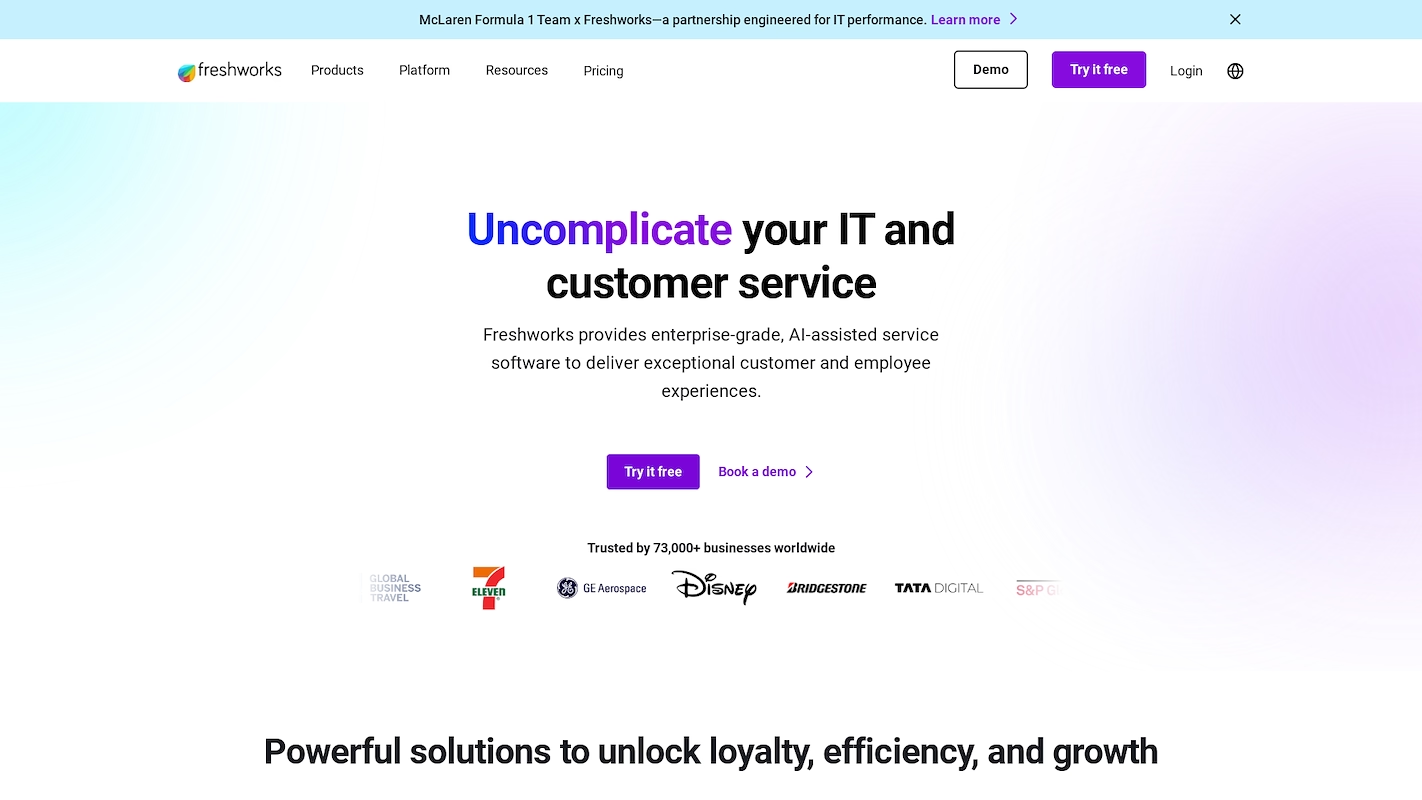
Freshsales is a CRM platform that unifies sales and marketing activity. It provides a single customer view to manage leads, deals, and engagement. Use cases include sales pipeline management and workflow automation. The system also handles communication with prospects across different channels.
Freshsales's Main Features
- The platform includes marketing automation tools for managing email marketing, campaigns, and leads.
- It offers a customer support module with case management, a customer portal, and a knowledge base.
- The system provides reporting and analytics features, including dashboards and sales forecasting.
- It contains sales force automation to manage tasks, activities, and sales pipelines.
How Freshsales Compares To NetHunt CRM
Average Review score: 4.5/5 stars based on 1,224 G2 reviews.
- Freshsales includes Freddy AI to help draft emails and find deal insights. This provides an analytical layer different from NetHunt's core functions inside Gmail.
- It offers built-in phone and chat capabilities for direct communication. This expands contact options beyond the email-centric approach of NetHunt CRM.
- The platform has a customer support module with case management and a knowledge base. This adds a service function that is separate from NetHunt's primary focus on sales pipeline management.
- This tool provides marketing automation for managing campaigns. This allows for more structured lead generation compared to NetHunt's organization of contacts within Gmail.
Where NetHunt CRM Has An Edge Over Freshsales
- Freshsales is a standalone platform, so users must leave their inbox for CRM tasks. In contrast, NetHunt works inside Gmail, which some teams find more efficient for daily work.
- Its broad feature set for marketing and support can introduce a learning curve. Teams that need a simple sales tool might find NetHunt's focused design inside Gmail easier to adopt.
- Some users find that NetHunt's method of turning Gmail contacts into CRM records feels more direct. This is different from managing data in a separate system like Freshsales, even with an integration.
Pricing and Cost-Effectiveness
Freshsales offers paid plans starting at $9 per user monthly for Growth, with Pro at $39 and Enterprise at $59. A direct cost comparison with NetHunt CRM is not possible as its pricing data was not provided. You can check the detailed pricing on Freshsales's official website.
9) Agile CRM
Agile CRM is a platform that combines sales, marketing, and service functions. It helps businesses manage contacts, track deals, and automate marketing campaigns from a single dashboard. The system provides tools for the entire customer lifecycle.

Agile CRM is a platform that unifies sales, marketing, and service functions into a single dashboard. It allows businesses to manage contacts, follow deal progress, and automate campaigns. The system provides tools to support the entire customer lifecycle.
Agile CRM's Main Features
- The platform includes marketing automation with a drag-and-drop editor and automatically nurtures leads based on web activity.
- It includes a helpdesk module to manage support tickets and provides a customer support portal.
- The system enables multi-channel communication, allowing users to call, email, or tweet contacts from a single page.
- It offers web analytics to monitor customer behavior on a website and convert visitors into CRM leads.
How Agile CRM Compares to NetHunt CRM
Average Review score: 4.0/5 stars based on 352 G2 reviews.
- Agile CRM includes marketing automation with a visual journey builder. This provides more complex options for lead campaigns compared to NetHunt's core email management inside Gmail.
- It provides a built-in helpdesk module that manages support tickets. This adds a customer service function that is not a primary focus of NetHunt's sales-oriented system.
- The platform enables multi-channel communication, so users can call or tweet contacts from the same interface. This offers more contact options than NetHunt's primary focus on email.
- This tool offers web analytics to track visitor behavior on your site and convert them into leads. This provides a lead generation method different from NetHunt, which creates CRM records from Gmail contacts.
Where NetHunt CRM Has An Edge Over Agile CRM
- Agile CRM operates as a separate platform, so users must switch between their email and the CRM. Some teams may find this less efficient compared to NetHunt, which works directly inside the Gmail interface.
- Its all-in-one design for sales, marketing, and service can feel overwhelming for teams that need a simple sales tool. In contrast, NetHunt provides a more focused solution for pipeline management inside the inbox.
- Some users report that the interface feels less intuitive than a tool embedded in Gmail. NetHunt turns Gmail contacts into CRM records, which can feel more direct for data entry that starts from an email.
Pricing and Cost-Effectiveness
Agile CRM offers a free plan, and its paid plans are priced at $8.99 for Starter, $29.99 for Regular, and $47.99 for Enterprise per user monthly. A direct cost comparison with NetHunt CRM is not possible as its pricing data was not provided. You can check the detailed pricing on Agile CRM's official website.
10) Close CRM
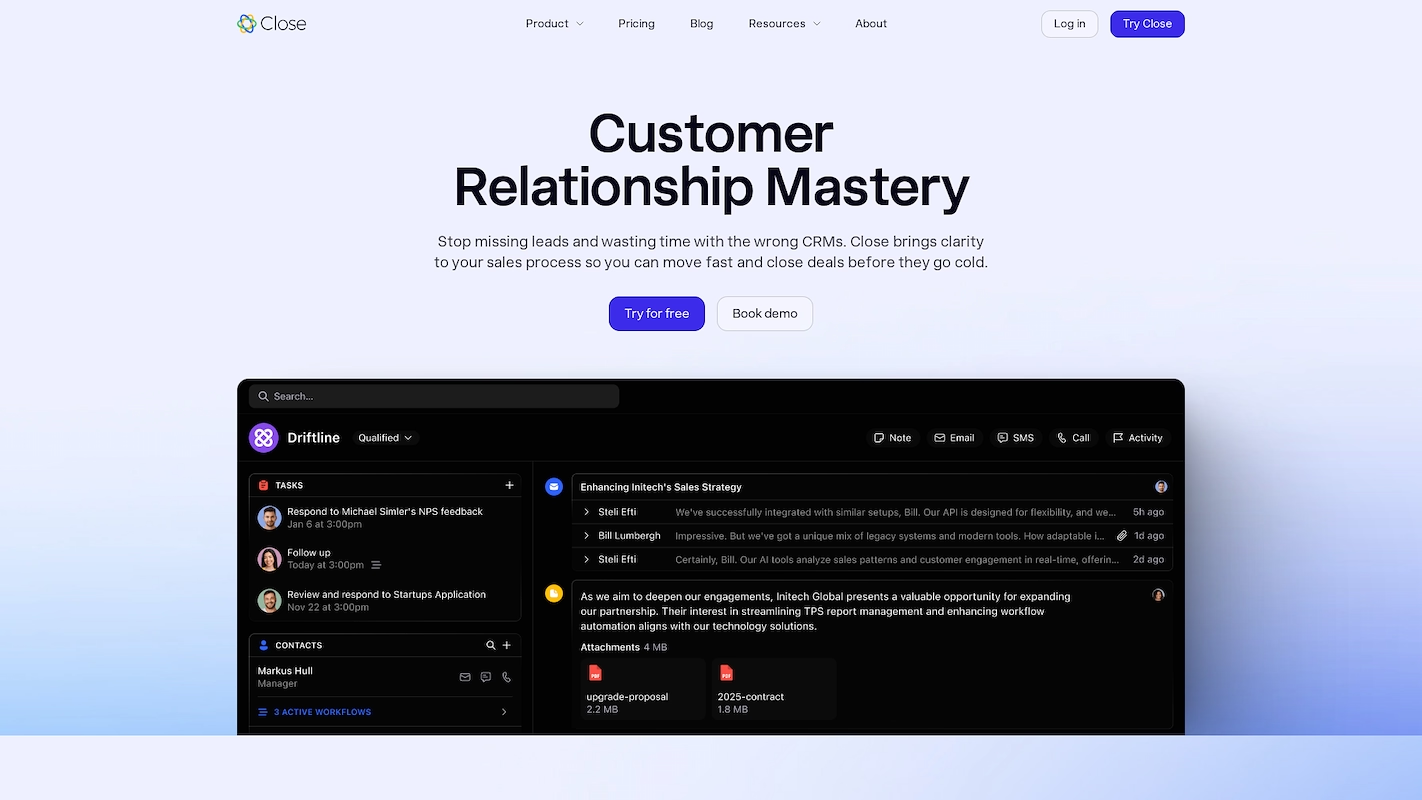
Close CRM is a sales platform built for communication. It puts email, phone calls, and SMS messages into a single workspace. Sales teams use it to manage their outreach and automate follow-up tasks. The tool is for businesses that want to increase sales velocity through direct contact with leads.
Close CRM's Main Features
- The platform combines email, calling, and SMS into a single unified inbox.
- It provides sales force automation to manage tasks, activities, and pipelines.
- The system includes an auto dialer and features for outbound call tracking.
- It offers a customer support module with case management and a knowledge base.
How Close CRM Compares to NetHunt CRM
Average Review score: 4.7/5 stars based on 1,812 G2 reviews.
- Close CRM combines email, calling, and SMS into a single inbox. This provides more communication channels than NetHunt's email-centric approach inside Gmail.
- It includes a built-in auto dialer for outbound calls. This feature offers a more direct way to contact leads compared to the email management functions in NetHunt.
- The platform provides AI-driven suggestions to guide sales actions. This adds a predictive element that is different from NetHunt's focus on organizing CRM data within the inbox.
- This tool is designed for sales velocity with features like a powerful dialer. This makes it a more specialized option for teams focused on high-volume outreach than NetHunt's broader CRM functions.
Where NetHunt CRM Has An Edge Over Close
- Close CRM is a standalone platform, which requires users to switch contexts away from their inbox. NetHunt, in contrast, works entirely inside Gmail, which may offer a more seamless workflow for teams that manage sales primarily through email.
- Some users note that Close CRM can require manual data entry. This differs from NetHunt's approach, which automatically creates CRM records from contacts inside Gmail, a method that might feel more direct for some teams.
- Its design centers on high-velocity sales with built-in calling and SMS. For teams that only need to manage a sales pipeline within their email, this might introduce unneeded complexity compared to NetHunt's more focused, email-centric workflow.
Pricing and Cost-Effectiveness
Close CRM offers plans starting at $9 per user monthly for Solo, with Essentials at $35, Growth at $99, and Scale at $139. A direct cost comparison with NetHunt CRM is not possible as its pricing data was not provided. For the most accurate information, check Close CRM's official website.
Which One Should You Go With?
Choosing the right NetHunt CRM alternative depends on your team's specific needs and workflow. This guide presented several options with their pros and cons to help you narrow down your choices and make an informed decision.
If you want to automate your sales playbook, consider 11x. Our AI agents find accounts, perform outreach, and qualify inbound leads. This unifies separate tools for data, outreach, and email warmup into one platform, allowing your team to focus on sales.




